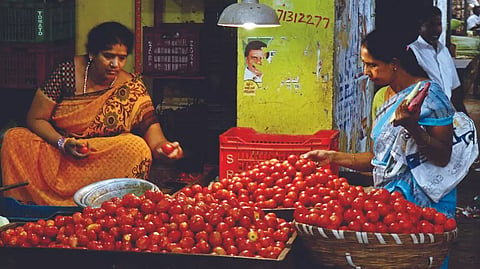

CHENNAI: Skyrocketing tomato prices have forced consumers to change their lifestyle in order to tighten their purse strings. Families are forced to look for alternative options for tomatoes in the kitchen.
The uncertain weather conditions experienced in Tamil Nadu, Andhra Pradesh, and Karnataka and the drastic drop in the prices four months back has had a big toll on tomato cultivation which resulted in a shortage in supply. Tomatoes which were sold at Rs 5 to Rs 10 per kg by February 2023 are being sold at Rs 120 to Rs 130 per kg in the city.
Families are forced to compromise with tomatoes which are an irreplaceable ingredient in the kitchen because of plummeting prices some time back. As tonnes of perishable commodities were dumped in Tamil Nadu and neighbouring states not getting good rates farmers decided to cut down the crop cultivation by around 50% in March, leading to the present-day crisis.
The lower-middle is hit hard by the price rise and is finding it difficult to afford spending Rs 50 for half kg of tomato. Some of the families are reportedly using alternatives such as tamarind and lemons.
However, professional cooks stated that though tomato is a fruit it plays a vital part in vegetables, and is a basic ingredient for cooking. Preethi Rajkumari, a chef said, “tomato does not only add sour flavour to the dishes, but also enhances the taste. We cannot cook food items without using tomatoes.
Maybe because of inflation people can reduce the quantity. But one cannot completely avoid using it as it would bring a huge difference in the dish.” Addressing the issue, minister for co-operatives KR Periyakaruppan is set to hold a meeting on the sudden surge of tomato prices in the state. He is expected to take up measures such as importing from other states and selling tomatoes at ration shops with the officials. Already, the state government has decided to sell tomatoes for Rs 60 per kg at government run farm fresh outlets, which has been welcomed by the public.
Demand-supply mismatch takes price to over 120 per kg
The prices of tomatoes continue to soar in the city markets due to shortage in supply hitting households badly. As tomatoes are a staple ingredient of Indian households, the price rise is looked at with concern- both by the public and the government.
The situation is so worse that the state government has taken the initiative to sell tomatoes at Rs 60 per kg through government run farm fresh outlets, in order to provide relief to the public.
Apart from supplies from cultivators within Tamil Nadu, the arrival from nearby states has also dwindled. As Andhra Pradesh, Karnataka were also supplying less quantity of tomatoes, the wholesale prices skyrocketed to Rs 100 per kg, and retail rates touched Rs 120 to Rs 130 per kg in the city. The price is expected to increase further in a week as supply issues are connected with the cultivation pattern of tomatoes.
Traders said that the supply would stabilise only after the commencement of third crop cultivation that begins by the mid of July. The market usually receives 90 to 100 trucks. The price of tomatoes were stable at around Rs 20 per kg at that time period.
The vegetable markets in the city are getting only 30 truckloads of the vegetable, leading to a demand- supply issue. The supply would remain unstable in the next few days and the prices might spike up to Rs 100 per kg in the wholesale market, traders said.
Households will be severely hit as retail shops may sell it for Rs 150 per kg once wholesale prices go up, market sources said. The public is left to have a relief with the government initiative to sell tomatoes at Rs 60 per kg through government run farm fresh outlets. The initiative has been welcomed by the public as it would reduce the spending burden on Tomatoes, an essential ingredient in Indian cuisine.